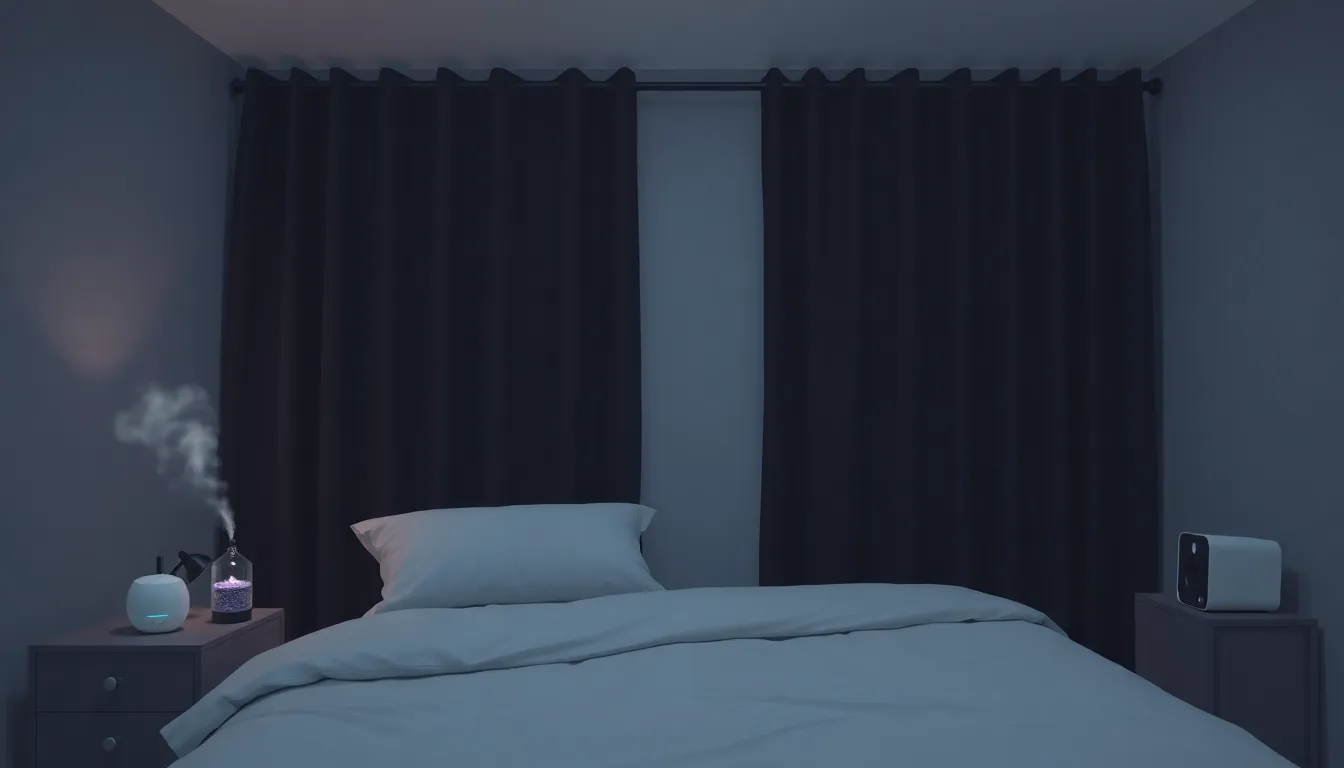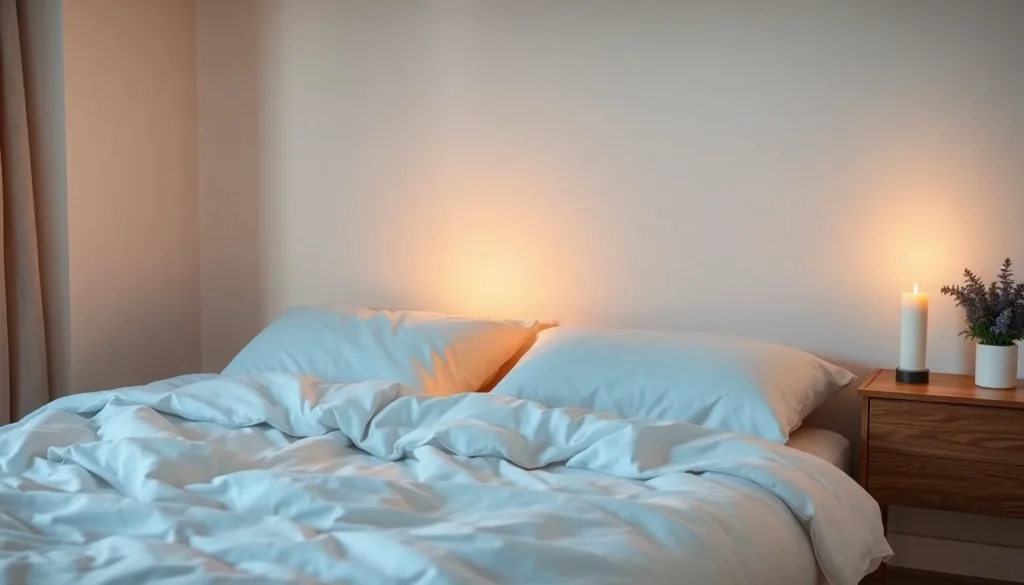After a long day of juggling responsibilities, nothing beats the bliss of a peaceful night’s sleep. Yet for many, the quest for that elusive slumber feels like searching for a unicorn in a haystack. Tossing and turning, counting sheep, and wondering if that midnight snack was a good idea can turn a cozy bed into a battleground of insomnia.
Table of Contents
ToggleImportance Of A Peaceful Night
A peaceful night significantly impacts overall health and well-being. Quality sleep enhances cognitive function, emotional stability, and physical health. Studies show that individuals who regularly experience restful nights report higher levels of productivity and focus during the day.
Sleep deprivation leads to numerous negative effects, including increased stress and impaired decision-making. Getting at least seven hours of uninterrupted sleep can improve mood and strengthen the immune system. Those who prioritize sleep often find it easier to cope with daily challenges.
Maintaining a consistent sleep schedule fosters better sleep hygiene. People who go to bed and wake up at the same time daily often experience deeper, more restorative sleep. Moreover, a bedroom environment that promotes relaxation can facilitate this process.
Creating a calming bedtime routine can enhance the transition from wakefulness to sleep. For example, engaging in calming activities such as reading, taking a warm bath, or practicing relaxation techniques has proven beneficial. Limiting screen time before bed further supports these efforts, as artificial light from devices can interfere with the body’s natural sleep-wake cycle.
Higher-quality sleep contributes to improved metabolic functioning and weight management. Those with a consistent sleep pattern often demonstrate better dietary choices and a balanced lifestyle. Recognizing the importance of a peaceful night encourages individuals to make sleep a priority, ultimately leading to healthier lives.
Preparation For A Peaceful Night

Preparation for a peaceful night involves creating an environment conducive to sleep and establishing a consistent routine.
Creating A Relaxing Environment
A calming atmosphere promotes restful sleep. Dim lights can signal the body that it’s time to wind down. Consider using blackout curtains to block outside light effectively. Comfortable bedding enhances relaxation, making the bed inviting. Ensuring a cool room temperature encourages deeper sleep. Additionally, incorporating soothing scents like lavender or chamomile can aid in relaxation. Noise reduction, through earplugs or white noise machines, minimizes disturbances. These small changes collectively create a sanctuary for sleep.
Setting A Consistent Sleep Schedule
Establishing a consistent sleep schedule significantly impacts sleep quality. Going to bed and waking up at the same time daily strengthens the body’s internal clock. Consistency promotes better sleep cycles, leading to more restful nights. Gradually adjusting sleep times, rather than making sudden changes, helps the body adapt smoothly. Limiting daytime naps, especially if longer than 30 minutes, can improve nighttime sleep. Engaging in pre-sleep rituals, like reading or meditating, reinforces that it’s time for rest. These practices enhance overall sleep hygiene and support a healthier lifestyle.
Techniques For Achieving Peaceful Sleep
Multiple techniques exist for fostering peaceful sleep. Mindfulness and meditation practices significantly contribute to relaxation and tranquility.
Mindfulness And Meditation Practices
Mindfulness enhances awareness of the present moment, helping to reduce racing thoughts before sleep. Practicing mindfulness techniques, like body scans or focused breathing, brings attention to one’s body sensations, promoting relaxation. Meditative practices, such as guided imagery or loving-kindness meditation, also encourage calming mental states. Integrating these practices into a nightly routine can result in improved sleep quality. Engaging in mindfulness exercises for as little as 10 to 20 minutes can yield notable benefits. Regular practitioners frequently experience decreased anxiety levels, making it easier to drift off to sleep.
Breathing Exercises For Relaxation
Breathing exercises effectively lower stress and tension, facilitating a smoother transition to sleep. Techniques like the 4-7-8 breathing method promote relaxation by regulating breath. Inhale through the nose for four counts, hold for seven counts, and exhale through the mouth for eight counts. This simple pattern calms the nervous system, leading to a sense of peace. Another method, diaphragmatic breathing, focuses on deep belly breaths. Such exercises allow the body to activate the relaxation response, preparing it for rest. Committing to these exercises before bedtime encourages a more serene sleep environment.
Lifestyle Changes To Enhance Sleep Quality
Incorporating lifestyle changes can significantly improve sleep quality. Changes in daily habits pave the way for more restful nights.
Healthy Diet And Hydration
Nutrition directly influences sleep quality. Eating a balanced diet rich in fruits, vegetables, and whole grains supports overall health. Foods high in magnesium, like almonds and spinach, promote relaxation. Limiting caffeine and alcohol intake, especially in the hours leading up to bedtime, encourages better sleep patterns. Staying adequately hydrated throughout the day helps avoid nocturnal awakenings. Heavy meals right before bed can disrupt sleep, so it’s best to allow two to three hours between eating and sleeping.
Physical Activity For Better Sleep
Regular physical activity boosts sleep quality significantly. Engaging in at least 150 minutes of moderate aerobic exercise each week leads to deeper, more restorative sleep. Morning workouts help enhance alertness throughout the day, while evening exercises promote relaxation. Strenuous exercise close to bedtime may energize the body, so it’s advisable to schedule workouts earlier in the day. Incorporating gentle stretching or yoga in the evening can ease tension and prepare the body for restful sleep. Prioritizing consistent exercise habits ultimately plays a key role in achieving better sleep outcomes.
Achieving a peaceful night’s sleep is essential for overall well-being. By implementing strategies like maintaining a consistent sleep schedule and creating a calming bedtime routine, individuals can significantly enhance their sleep quality. Engaging in relaxing activities before bed and optimizing the sleep environment are vital steps toward restful nights.
Incorporating mindfulness and breathing techniques further supports the transition to sleep. Recognizing the importance of lifestyle changes, such as a balanced diet and regular exercise, can also contribute to better sleep outcomes. Prioritizing these practices not only leads to improved sleep but also fosters healthier, more productive lives. Embracing these tips can transform nights into a time of rejuvenation and peace.



